Charles E W Bean, Diaries, AWM38 3DRL 606/3/1 - March - April 1915 - Part 6
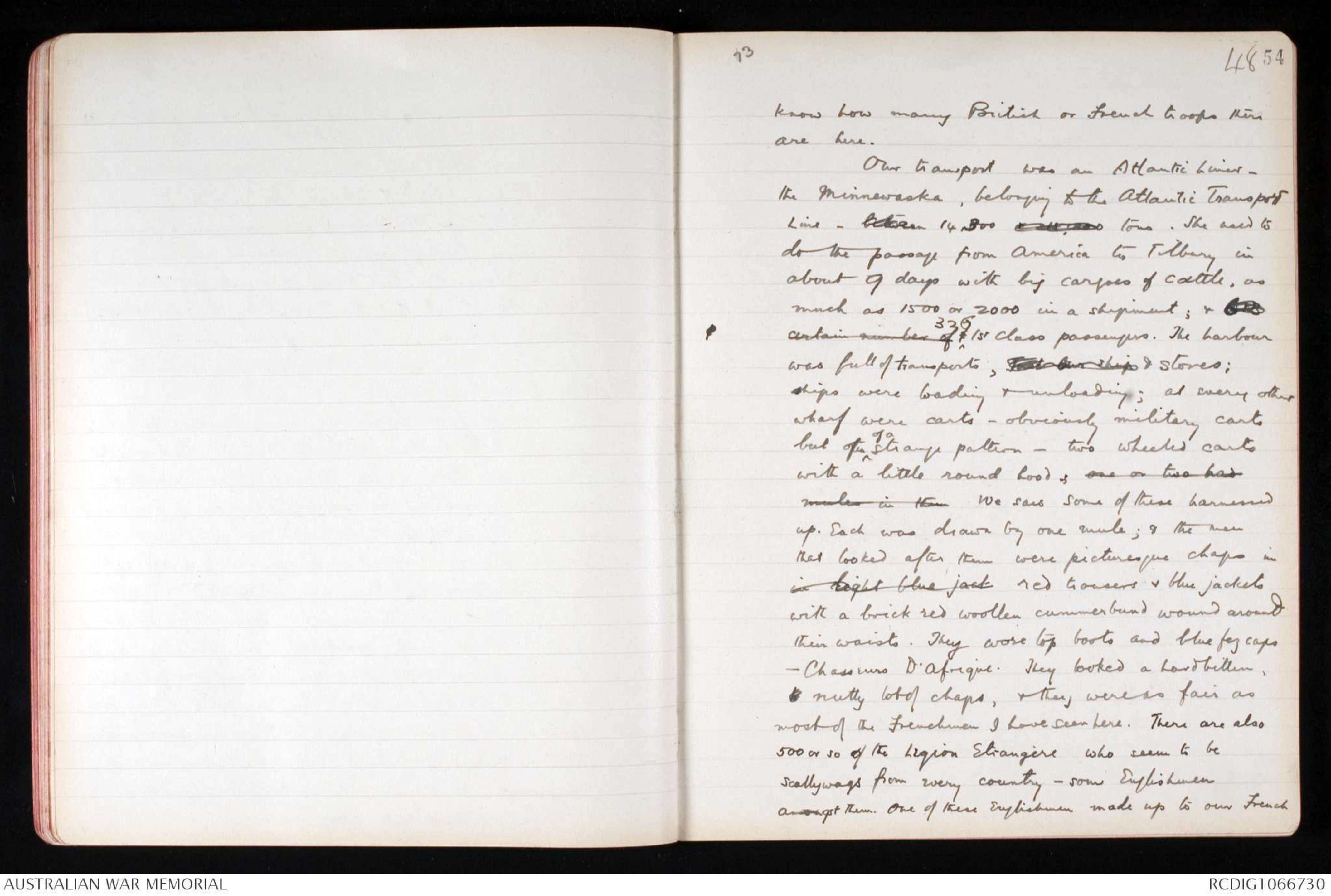
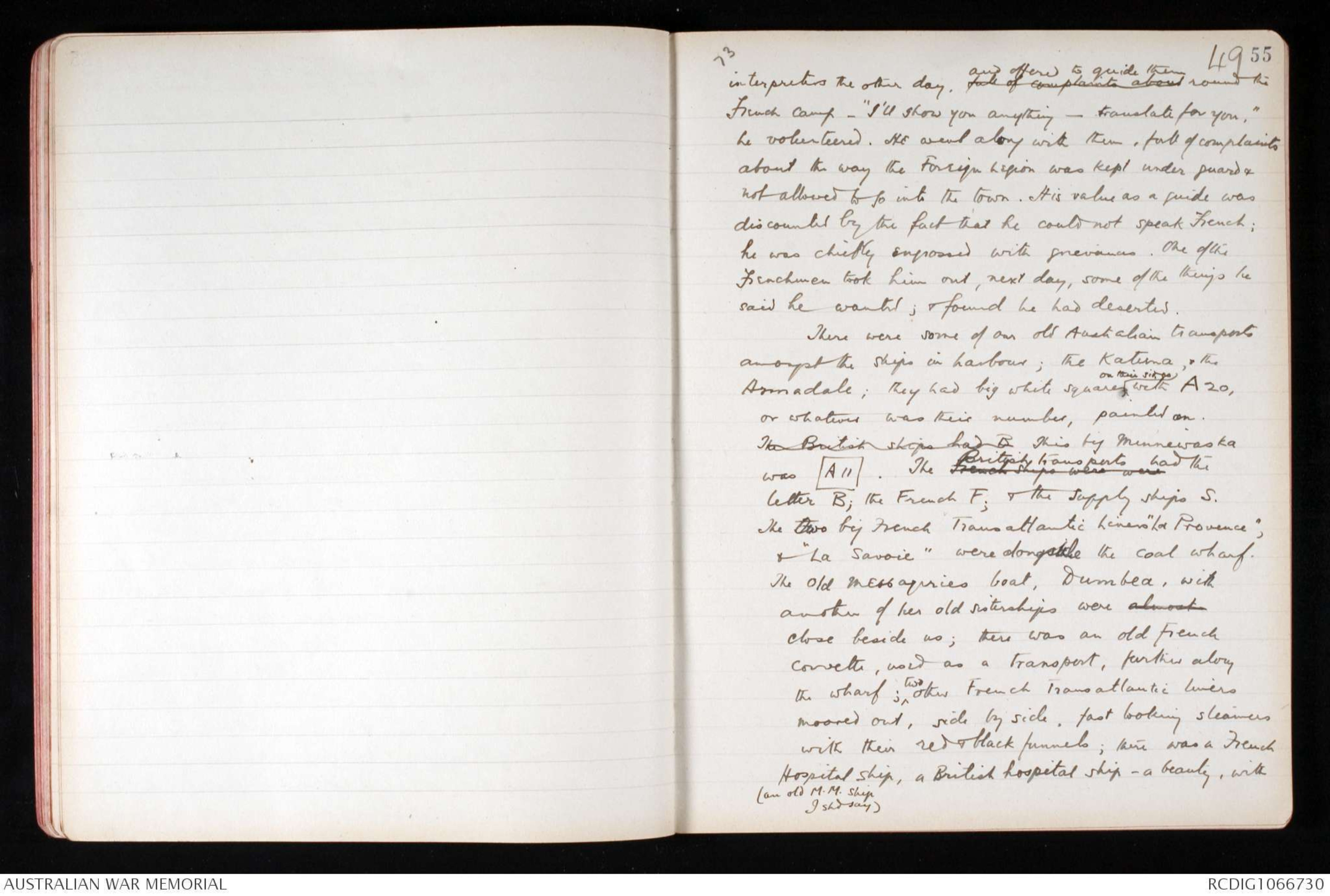
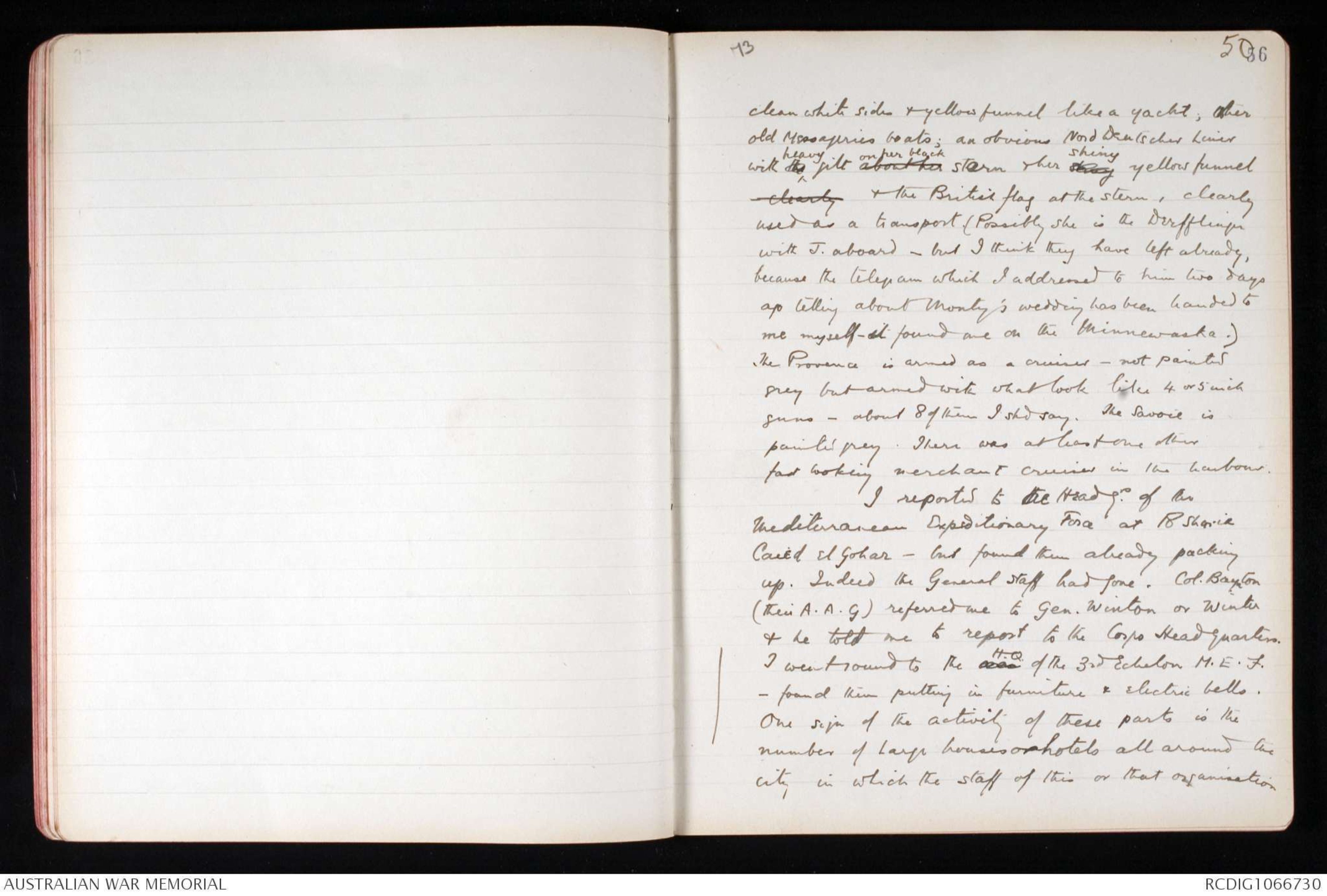
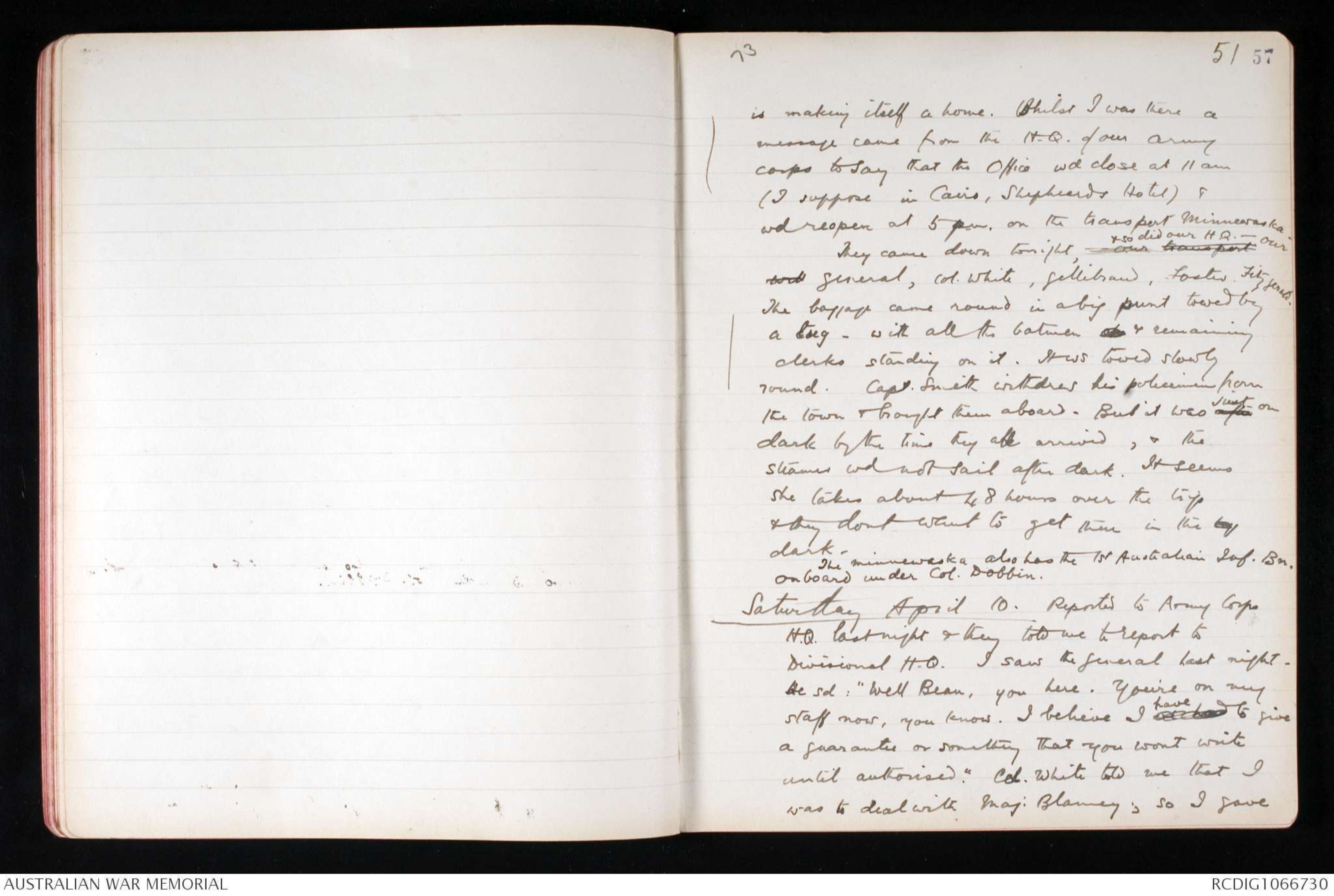
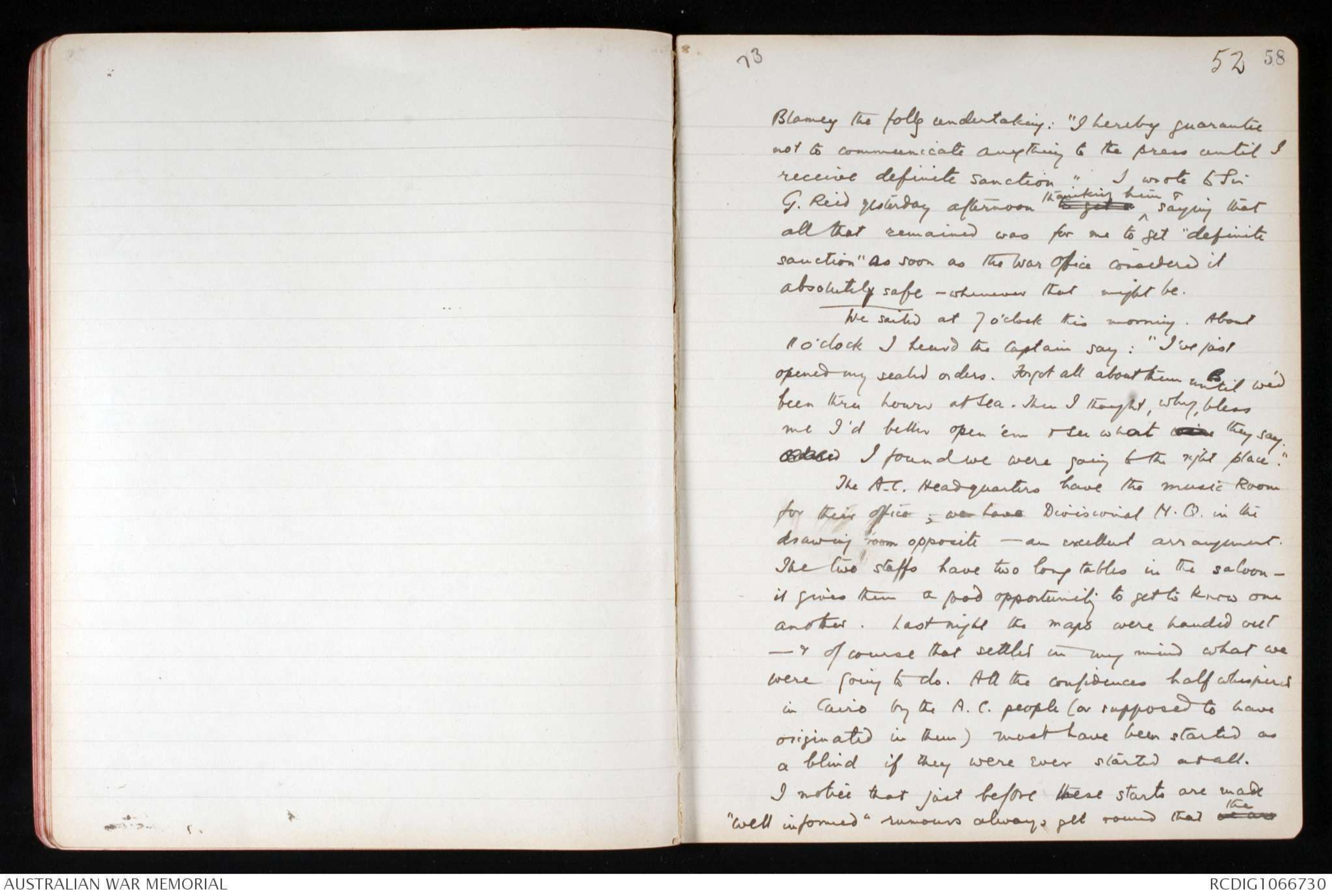
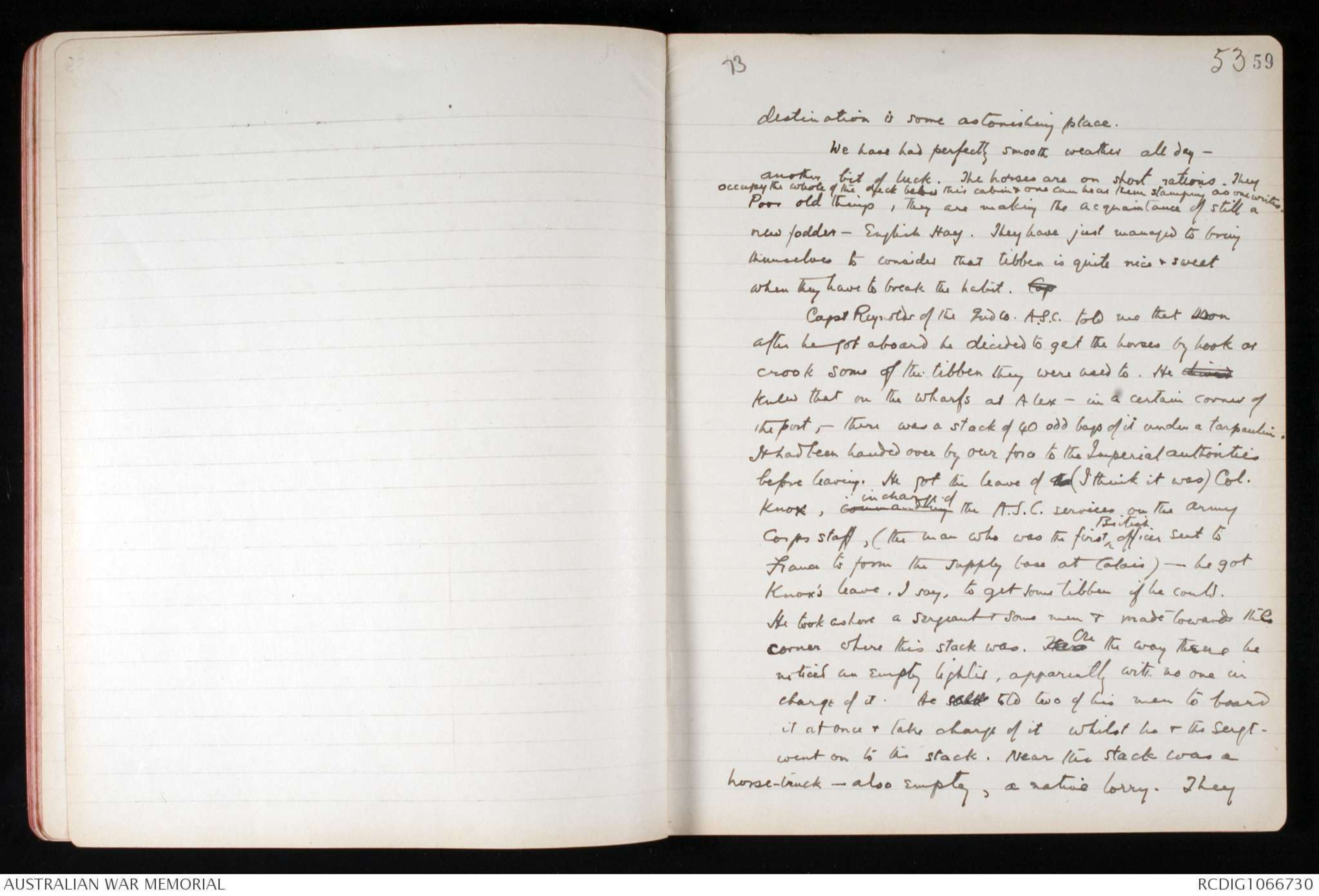
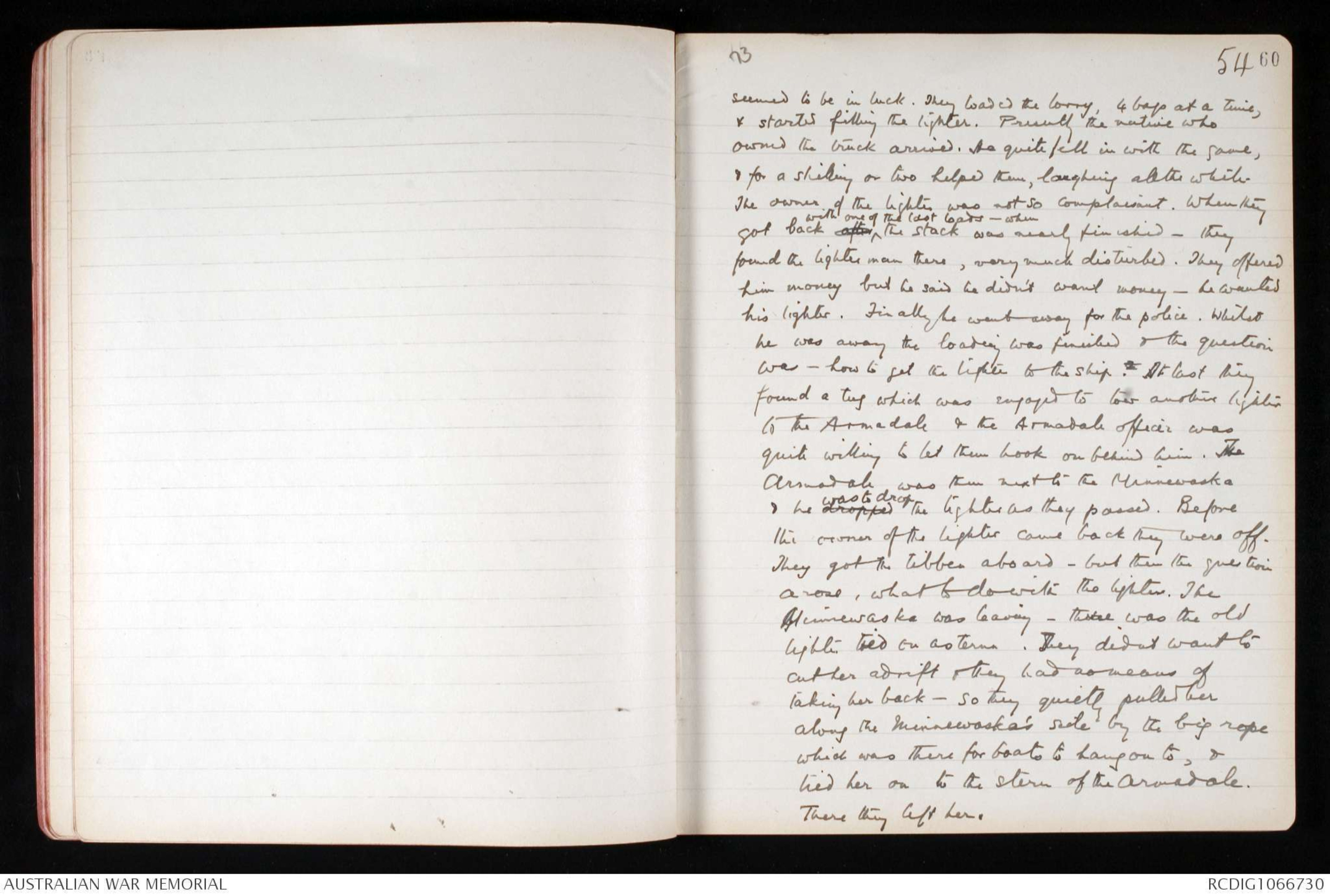
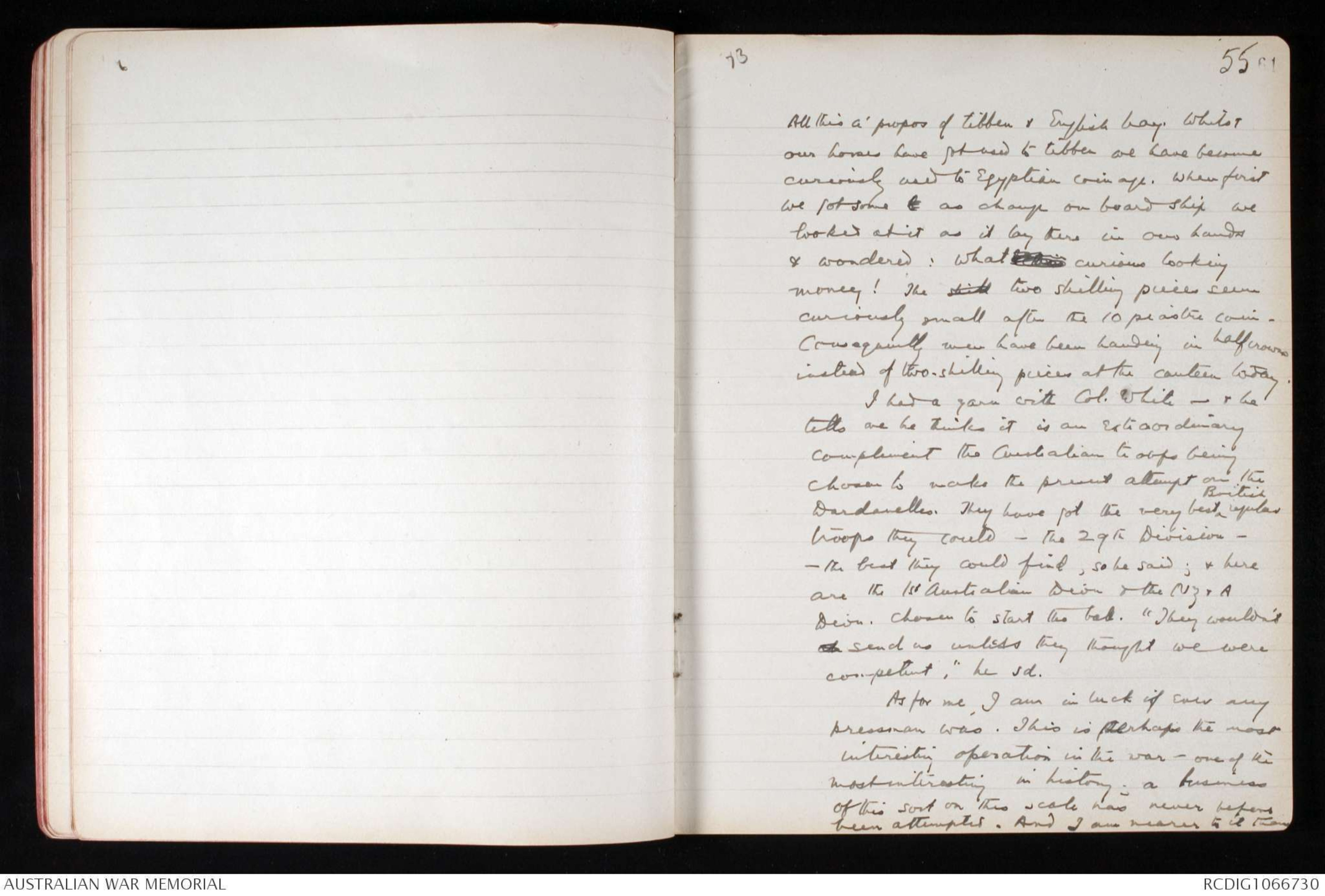
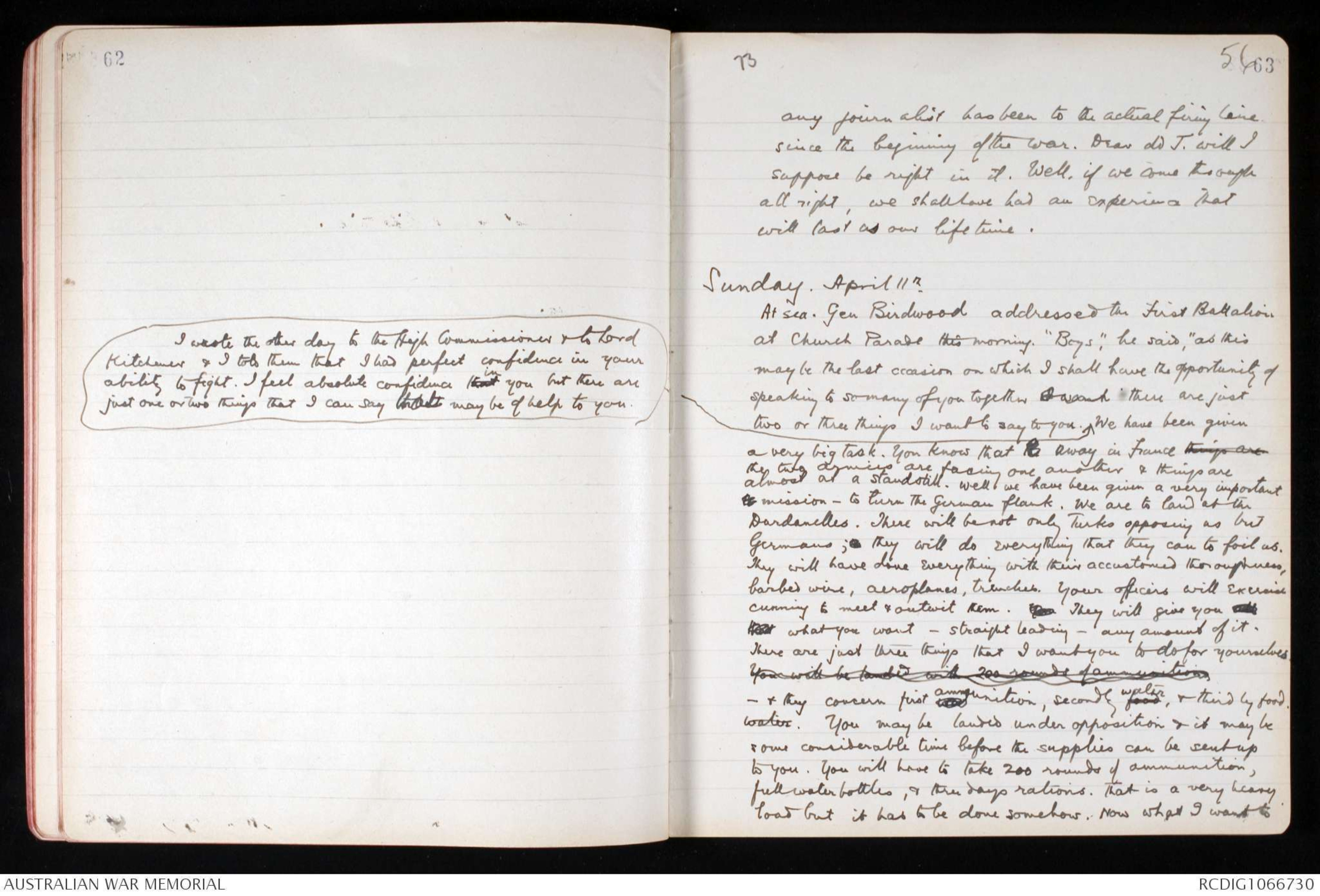
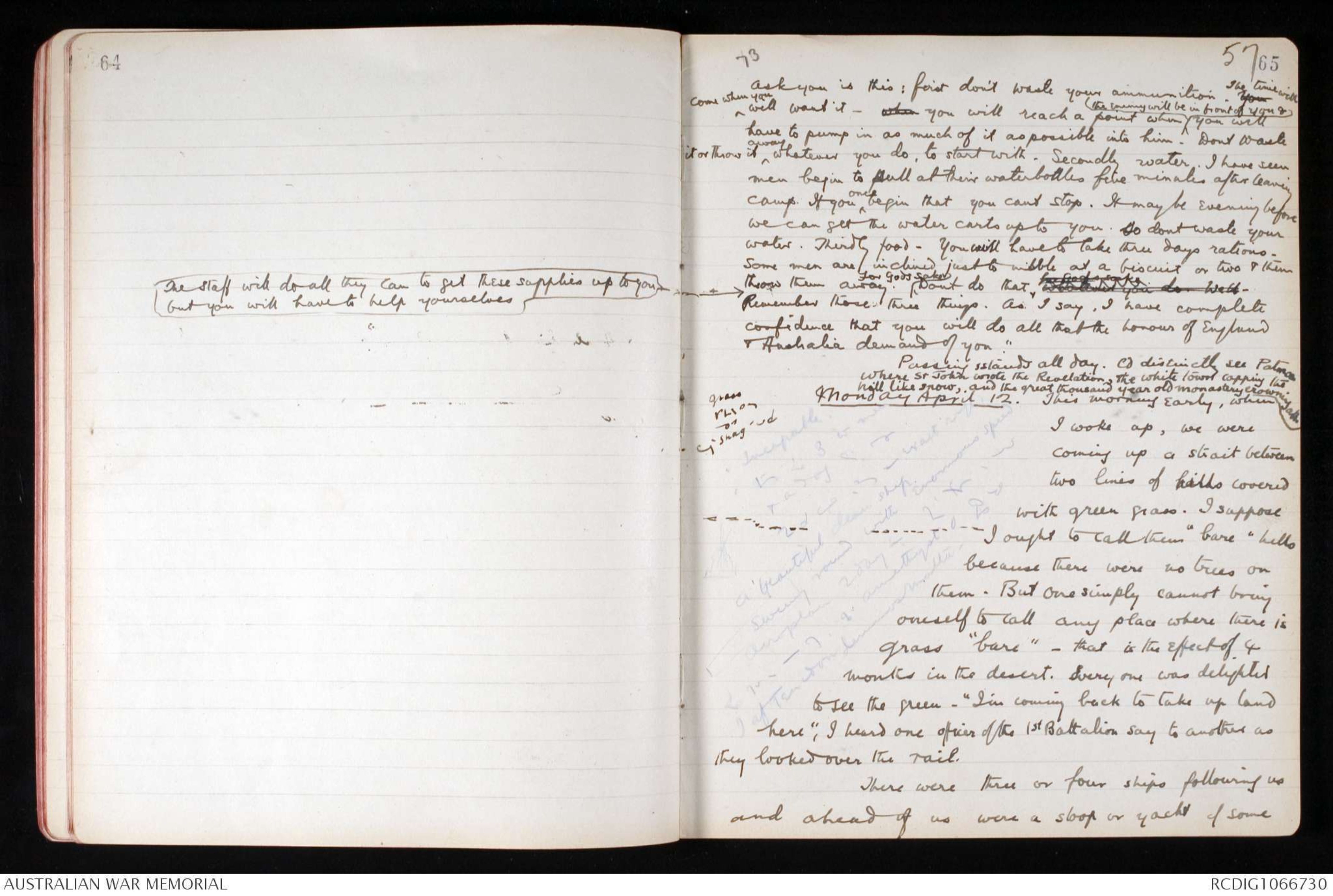
73 48 54
know how many British or French troops there
are here.
Our transport was an Atlantic Liner-
the Minnewaska, belonging to the Altantic Transport
Line. Between 14,300 & abt xxx tons. She used to
do the passage from America to Tilbury in
about 9 days with big cargoes of cattle, as
much as 1500 or 2000 in a shipment; & xxxcertain number of ^ 326 1st class passengers. The harbour
was full of transports, xxx our ship & stores;
ships were loading & unloading; at every other
wharf were carts - obviously military carts
but often ^ of a strange pattern - two wheeled carts
with a little round hood; one or two hadmules in them We saw some of these harnessed
up. Each was drawn by one mule; & the men
that looked after them were picturesque chaps inin light blue jack red trousers & blue jackets
with a brick red woollen cummerbund wound around
their waists. They wore top boots and blue fez caps
-Chasseurs D'Afrique. They looked a hard bitten,& nutty lot of chaps, & they were as fair as
most of the Frenchmen I have seen here. There are also
500 or so of the Legion Etrangere who seem to be
scallywags from every country - some Englishmen
amongst them. One of these Englishmen made up to our French
73 49 55
interpreters the other day, full of complaints about and offered to guide them round the
French camp - "I'll show you anything - translate for you,"
he volunteered. He went along with them, full of complaints
about the way the Foreign Legion was kept under guard &
not allowed to go into the town. His value as a guide was
discounted by the fact that he could not speak French;
he was chiefly engrossed with grievances. One of the
Frenchmen took him out, next day, some of the things he
said he wanted; & found he had deserted.
There were some of our old Australian transports
amongst the ships in harbour; the Katuna, & the
Armadale; they had big white squares ^ on their sides with A20,
or whatever was their number, painted on.The British ships had B This big Minnewaska
was A11. The French ships were were British transports had the
letter B; the French F; & the supply ships S.
The two big French Transatlantic Liners "La Provence",
& "La Savoie" were alongside the coal wharf.
The old messageries boat, Dumbea, with
another of her old sisterships were almost
close beside us; there was an old French
corvette, used as a transport, farther along
the wharf; ^ two other French Transatlantic liners
moored out, side by side, fast looking steamers
with their red & black funnels; there was a French
Hospital ship, a British hospital ship - a beauty, with
(an old M.M. ship
I shd say)
73 50 56
clean white sides & yellow funnel like a yacht; other
old Messageries boats; an obvious Nord Deutscher Liner
with the ^ heavy gilt about her on her black stern & her strong shiny yellow funnelclearly & the British flag at the stern, clearly
used as a transport. (Possibly she is the Derfflinger
with J. aboard - but I think they have left already,
because the telegram which I addressed to him two days
ago telling about Monty's wedding has been handed to
me myself - it found me on the Minnewaska.)
The Provence is armed as a cruiser - not painted
grey but armed with what look like 4 or 5 inch
guns - about 8 of them I shd say. The Savoie is
painted grey. There was at least one other
fast looking merchant cruiser in the harbour.
I reported to the Headqrs of the
Mediterranean Expeditionary Force at 18 Sharia
Caied el Gohar - but found them already packing
up. Indeed the General Staff had gone. Col. Bayton
(their A.A.G) referred me to Gen. Winton or Winter
& he told me to report to the Corps Headquarters.
I went round to the xxx H.Q. of the 3rd Echelon M.E.F.
- found them putting in furniture & electric bells.
One sign of the activity of these parts is the
number of large houses or hotels all around the
city in which the staff of this or that organisation
73 51 57
is making itself a home. Whilst I was there a
message came from the H.Q. of our army
corps to say that the Office wd close at II am
(I suppose in Cairo, Shepheards Hotel) &
wd reopen at 5 pm, on the transport Minnewaska.
They came down tonight, - our transport & so did our H.Q. - ourwith General, Col. White, Gellibrand, Foster. Fitzgerald.
The baggage came round in a big punt towed by
a tug - with all the batmen xx & remaining
clerks standing on it. It ws towed slowly
round. Capt. Smith withdrew his policemen from
the town & brought them aboard. But it was after just on
dark by the time they all arrived, & the
steamer wd not sail after dark. It seems
she takes about 48 hours over the trip
& they dont want to get there in the xx
dark.
The Minnewaska also has the 1st Australian Inf. Bn.
onboard under Col. Dobbin.
Saturday April 10. Reported to Army Corps
H.Q. last night & they told me to report to
Divisional H.Q. I saw the general last night.
He sd. "Well Bean, you here. You're on my
staff now, you know. I believe I xxx had have to give
a guarantee or something that you wont write
until authorised." Col. White told me that I
was to deal with Maj. Blamey; so I gave
73 52 58
Blamey the follg undertaking: "I hereby guarantee
not to communicate anything to the press until I
receive definite sanction." I wrote to Sir
G. Reid yesterday afternoon to get a ^ thanking him & saying that
all that remained was for me to get "definite
sanction" as soon as the War Office considered it
absolutely safe - whenever that might be.
We sailed at 7 o'clock this morning. About
11 o'clock I heard the Captain say: "I've just
opened my sealed orders. Forgot all about them x until we'd
been three hours at Sea. Then I thought, why, bless
me I'd better open 'em & see what we're they say.Ordered I found we were going to the right place."
The A.C. Headquarters have the music Room
for their office, we have Divisional H.Q. in the
drawing room opposite - an excellent arrangement.
The two staffs have two long tables in the saloon -
it gives them a good opportunity to get to know one
another. Last night the maps were handed out
- & of course that settled in my mind what we
were going to do. All the confidences half whispered
in Cairo by the A.C. people (or supposed to have
originated in them) must have been started as
a blind if they were ever started at all.
I notice that just before these starts are made
"well informed" rumours always get round that we are the
73 53 59
destination is some astonishing place.
We have had perfectly smooth weather all day -
another bit of luck. The horses are on short rations. They
occupy the whole of the deck below this cabin & one can hear them stamping as one writes.
Poor old things, they are making the acquaintance of still a
new fodder - English Hay. They have just managed to bring
themselves to consider that tibben is quite nice & sweet
when they have to break the habit. Cap
Capt Reynolds of the 2nd Co. A.S.C. told me that soon
after he got aboard he decided to get the horses by hook or
crook some of the tibben they were used to. He dived
knew that on the wharfs at Alex - in a certain corner of
the port, - there was a stack of 40 odd bags of it under a tarpaulin.
It had been handed over by our force to the Imperial authorities
before leaving. He got the leave of the (I think it was) Col.
Knox, commanding in charge of the A.S.C. services on the Army
Corps staff, (the man who was the first ^ British officer sent to
France to form the supply base at Calais) – he got
Knox's leave. I say, to get some tibben if he could.
He took ashore a sergeant & some men & made towards the
corner where this stack was. xxx On the way there he
noticed an empty lighter, apparently with no one in
charge of it. He said told two of his men to board
it at once & take charge of it whilst he & the Sergt.
went on to the stack. Near the stack was a
horse-truck - also empty, a native lorry. They
73 54 60
seemed to be in luck. They loaded the lorry, 4 bags at a time,
& started filling the lighter. Presently the native who
owned the truck arrived. He quite fell in with the game,
& for a shilling or two helped them, laughing all the while.
The owner of the lighter was not so complaisant. When they
got back after ^ with one of the last loads - when the stack was nearly finished - they
found the lighter man there, very much disturbed. They offered
him money but he said he didn't want money - he wanted
his lighter. Finally he went away for the police. Whilst
he was away the loading was finished & the question
was - how to get the lighter to the ship. 2 At last they
found a tug which was engaged to tow another lighter
to the Armadale & the Armadale officer was
quite willing to let them hook on behind him. The
Armadale was there next to the Minnewaska
& he dropped was to drop the lighter as they passed. Before
the owner of the lighter came back they were off.
They got the tibben aboard - but then the question
arose, what to do with the lighter. The
Minnewaska was leaving - there was the old
lighter tied on astern. They didnt want to
cut her adrift & they had no means of
taking her back - so they quietly pulled her
along the Minnewaska's side by the big rope
which was there for boats to hang on to, &
tied her on to the stern of the Armadale.
There they left her.
73 55 61
All this a'propos of tibben & English hay. Whilst
our horses have got used to tibben we have become
curiously used to Egyptian coinage. When first
we got some t as change on board ship we
looked at it as it lay there in our hands
& wondered: what xxxxx curious looking
money! The shill two shilling pieces seem
curiously small after the 10 piastre coin.
Consequently men have been handing in half crowns
instead of two-shilling pieces at the canteen today.
I had a yarn with Col. White - & he
tells me he thinks it is an extraordinary
compliment the Australian troops being
chosen to make the present attempt on the
Dardanelles. They have got the very best ^ British regular
troops they could - the 29th Division -
- the best they could find, so he said; & here
are the 1st Australian Divn & the NZ & A
Divn. chosen to start the ball. "They wouldn'txx send us unless they thought we were
competent," he sd.
As for me, I am in luck if ever any
pressman was. This is perhaps the most
interesting operation in the war - one of the
most interesting in history, a business
of this sort on this scale has never before
been attempted. And I am nearer to it than
62
I wrote the other day to the High Commissioner & to Lord
Kitchener & I told them that I had perfect confidence in your
ability to fight. I feel absolute confidence that in you but there are
just one or two things that I can say that may be of help to you. ) →
73 56 63
any journalist has been to the actual firing line.
since the beginning of the war. Dear old J. will I
suppose be right in it. Well, if we come through
all right, we shall have had an experience that
will last us our life time.
Sunday. April 11th
At sea. Gen Birdwood addressed the First Battalion
at Church Parade this morning. "Boys! he said, "as this
may be the last occasion on which I shall have the opportunity of
speaking to so many of you together I want there are just
two or three things I want to say to you. ↑We have been given
a very big task. You know that the away in France things are
the two armies are facing one another & things are
almost at a standstill. Well we have been given a very importantxx mission - to turn the German flank. We are to land at the
Dardanelles. There will be not only Turks opposing us but
Germans; a they will do everything that they can to foil us.
They will have done everything with their accustomed thoroughness,
barbed wire, aeroplanes, trenches. Your officers will exercise
cunning to meet & outwit them. You They will give you allthat what you want - straight leading - any amount of it.
There are just three things that I want you to do for yourselvesYou will be landed with 200 rounds of ammunition
- & they concern first xxx ammunition, secondly food water, & thirdly food.water. You may be landed under opposition & it may be
some considerable time before the supplies can be sent up
to you. You will have to take 200 rounds of ammunition,
full water bottles, & three days rations. That is a very heavy
load but it has to be done somehow. Now what I want to
64
The staff will do all they can to get here supplies up to you —
but you will have to help yourselves →
73 57 65
ask you is this: first don't waste your ammunition. You The time will
^ come when you will want it - when you will reach a point when ^ the enemy will be in front of you & you will
have to pump in as much of it as possible into him. Dont Waste
it or throw it ^ away whatever you do, to start with. Secondly water. I have seen
men begin to pull at their waterbottles five minutes after leaving
camp. If you ^ once begin that you cant stop. It may be evening before
we can get the water carts up to you. So dont waste your
water. Thirdly food - You will have to take three days rations.
Some men are inclined just to nibble at a biscuit or two & then
throw them away. ^ For Gods sake dont do that, for Gods sake whatever you do. Well -
→
Remember those three things. As I say, I have complete
confidence that you will do all that the honour of England
& Australia demand of you."
Passing islands all day. Cd distinctly see Patmos
where St John wrote the Revelation, the white tower capping the
hill like snow, and the great thousand year old monastery crowning all.
[*grass*]
[shorthand]
[*Incapable.*]
[*shorthand*] [*3 w men*]
[*2nd coming in exact ring?*]
[* a beautiful clean ship.*]
[*swerving round with enormous speed*]
[*aeroplane 2 day in*] [*shorthand*]
[*Shorthand*] [*amethyst*] [*shorthand*]
[* / afternoon demonstration?*]
[Hand drawn diagram - see original document.]
Monday April 12. This morning early, when
I woke up, we were
coming up a strait between
two lines of hills covered
with green grass. I suppose
I ought to call them "bare" hills
because there were no trees on
them. But one simply cannot bring
oneself to call any place where there is
grass "bare" - that is the effect of 4
months in the desert. Every one was delighted
to see the green - "I'm coming back to take up land
here", I heard one officer of the 1st Battalion say to another as
they looked over the rail.
There were three or four ships following us
and ahead of us were a sloop or yacht of some
 Deb Parkinson
Deb ParkinsonThis transcription item is now locked to you for editing. To release the lock either Save your changes or Cancel.
This lock will be automatically released after 60 minutes of inactivity.